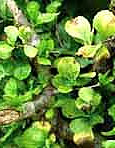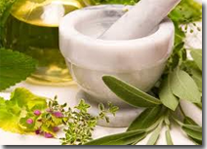

Commiphora Mukul Extract
| Family Name | : | Burseraceae (frankincense) |
| Common Name | : | Guggul, Guggulu, Guggulow |
![]() Commiphora Mukul Extract
Commiphora Mukul Extract

Guggul is the yellowish resin (or gum) that is produced by Commiphora mukul, a small, thorny plant that grows throughout northern India. Its active components, Z-guggulsterone and E-guggulsterone, have an ability to lower both cholesterol and triglyceride levels. Specifically, guggulipid lowers VLDL and LDL cholesterol and triglycerides while simultaneously raising HDL cholesterol.
This indicates guggul's primary use for providing protection against atherosclerosis. These effects are due to guggul's action on the liver which is stimulated to metabolise LDL cholesterol, effectively lowering the amount in the bloodstream.
Native to India, Guggul lipid has been used for a long time in Ayurvedic medicine to treat obesity and other weight related problems. Today, Guggul is frequently used to help lower cholesterol levels and decrease high blood pressure.
| Botanical Name | : | Commiphora mukul |
| Common Name | : | Guggul, Guggulu, Guggulow |
| Family Name | : | Burseraceae (frankincense) |
| Plant Part Used | : | Oleo-gum resin of whole plant habit |
| Description | : | Off white to light yellow |
| Application | : | |
| Active Principle | : | The primary chemical constituents of Guggul include phytosterols, guggulipids & guggulsterones. |
Uses
In chemical composition guggulu (extracted resin) consist of octanordammarana terpenes manusumbionic acid and manusumbinone as obtained from chemical analysis.
One of the main uses of Guggul is treatment of high cholesterol. Gum Guggul both lowered cholesterol levels and also separately protected against the development of hardening of the arteries. Guggul can improve cholesterol levels. Gum Guggul is said to help reduce high cholesterol, because it lowers harmful low-density lipoproteins while elevating the beneficial high-density lipoproteins.
Guggul may lower serum cholesterol levels by as much as 24%, and triglyceride levels by as much as 23%, by increasing the hepatic binding of LDL cholesterol. Its effects on HDL cholesterol levels are variable, either increasing or decreasing.
Mechanism
The guggulsterone, the active ingredient in the guggul extract, blocks the activity of a receptor in the liver's cells called Farnesoid X Receptor (FXR). Guggul blocks the receptor and affects how cholesterol is metabolised.
- A small controlled trial compared oral gugulipid against tetracycline for the treatment of acne and reported equivalent results.
- Guggul is also widely promoted as a weight loss agent.
- Helps prevent blood platelet aggregation and break up already-formed blood clots. Thus, this activity can help prevent heart disease and stroke. Guggul lipids have been the subject of several scientific studies, the results of which have been extremely encouraging as to the product's nutritional value to the circulatory system.
It is a heart tonic that strengthens the heart. Guggulsterone stimulates the thyroid gland, has anti-inflammatory properties, and protects against myocardial necrosis resulting from drug toxicity.
It helps in lowering in blood pressure levels and helps in maintaining it to normal levels.
Mechanism
Guggul decreases hepatic cholesterol levels and both of these actions help prevent atherosclerosis. Guggul is also an antioxidant, which helps stop the oxidization of cholesterol and the subsequent hardening of the arteries.
These effects are due to guggul's action on the liver and thyroid. The thyroid is stimulated to increase the body's metabolic rate, and the liver is stimulated to metabolize LDL cholesterol, effectively lowering the amount in the bloodstream.
- Guggul lipid stimulates the activity of white blood cells in the body, contributing to the buildup of the immune system. Assisting with the body's natural reaction to fight off infection, Guggul lipid also helps to eliminate and expel dead tissues, wastes and toxins from the body.
- Guggul lipid has been used to relieve coughing and lung congestion, soothe mucous membranes and alleviate other respiratory problems.
- Gum Guggul may also be used to treat arthritis and reduce inflammation of the joints.
It also possesses the property that helps in reversing the degenerative changes that has occurred in joint and bones. Due to this property, it is also believed in strengthening nervous system of the body. Hence widely used in diseases like rheumatoid arthritis, gout, osteoarthritis, sciatica, paralysis, hemiplegia, lymphadenopathy etc.
- Known topical applications include its use for canker sores.
- It relaxes the muscles which helps relieve menstrual pain.
- It acts as a blood detoxifier which breaks up stagnation in the body. Guggulu is widely used in skin diseases as it acts as blood purifier. It promotes the production of red blood corpuscles (RBC) and improves the action of white blood corpuscles (WBC), which are helpful in fighting against any kind of infections.
- Guggul is known to promote easy digestion, and control cholesterol. It also works in strengthening our digestive system, helps in easy secretions of digestive juices, works as appetizer, avoids indigestion and constipation, also beneficial in hemorrhoids and colitis. It is helpful in relieving from hyperacidity and belching. Good results have also been seen in liver related problems.
- It is also an aphrodisiac agent and promotes effective sperm production. Helps in improving sexual ability and sperm count. It also helps in improving sperm quality.
- Guggul is an antioxidant element and protects heart muscles by preventing oxidative damage.
Quality Products
- Boswellia Extract 50% to 80%
- Curcumin Extract 95%
- Commiphora Mukul Extract
- Gymnema Sylvestre Extract 25% to 75%
- Mucuna pruriens Extract 10% to 60%
- Tribulus terrestris Extract 20% to 60%
- Ashwagandha Extract Withania Somnifera
- Momordica Charantia Extract 3% to 10%
- Glycyrrhiza Glabra Extract 10% to 20%
- Bacopa monnieri Extract
- Andrographis paniculata
- Ginseng Extract
- Chlorophytum species
- Emblica officinalis Extract
- Fenugreek Extract
- Shilajeet Dry Extract


 SHIV SHAKTI HERBAL
SHIV SHAKTI HERBAL